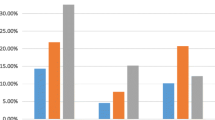Abstract
This paper addresses the use of health economics in relation to posttraumatic stress disorder (PTSD) in the Armed Forces, with a view to assessing the feasibility of carrying out future evaluative studies. Although psychological and pharmacological interventions can be used to treat PTSD, no economic evaluations are known to exist. There is an economic burden associated with PTSD, and treatments require the use of scarce resources. Health economics provides tools (including cost-effectiveness, cost–benefit, and cost–utility analyses) to ascertain the relative efficiency of different treatment options. The paper concludes that the quality of life and resource consequences of PTSD require a better understanding of the economics of the disorder and the alternative ways to treat it.
Similar content being viewed by others
References
Chisholm, D., Healey, A., & Knapp M. R. J. (1997). QALYs and mental health care. Social Psychiatry and Psychiatric Epidemiology, 32, 68–75.
Deahl, M. P., Gillham, A. B., Thomas, J., Searle, M. M., & Srinivasan, M. (1994). Psychological sequelae following the Gulf War: Factors associated with subsequent morbidity and the effectiveness of psychological debriefing. British Journal of Psychiatry 165, 60–65.
Drummond, M. F., O'Brien, B., Stoddart, G. L., & Torrance, G. W. (1997). Methods for the economic evaluation of health care programmes (2nd ed.). Oxford: Oxford University Press.
Gold, M. R., Siegel, J. E., Russell, L. B., & Weinstein, M. C. (1996). Cost-effectiveness in health and medicine. New York: Oxford University Press.
Helzer, J. E., Robins, L. N., & McEvoy, L. (1987). Post-traumatic stress disorder in the general population. New England Journal of Medicine, 317, 1630–1634.
Kessler, R. C., Sonnega, A., Bromet, E., Hughes, M., & Nelson, C. B. (1995). Posttraumatic stress disorder in the National Comorbidity Survey. Archives of General Psychiatry, 52, 1048–1060.
Kulka, R. A., Schlenger, W. E., Fairbank, J. A., Hough, R. L., Jordan, B. K., Marmar, C. R., et al. (1990). Trauma and the Vietnam War generation: Report of findings from the National Vietnam Veterans Readjustment Study. New York: Brunner/Mazel.
McCrone, P., & Weich, S. (2001). The costs of mental health care: paucity of measurement. In M. Tansella & G. Thornicroft (Eds.), Mental health outcomes measures (2nd ed.). London: Gaskell.
National Institute of Mental Health. (2001). Facts about post-traumatic stress disorder. (Publication no. OM-99 4157; Rev.). Retrieved June 5, 2002 from http://www.nimh.nih.gov/anxiety/ptsdfacts.cfm.
O'Brian, L. S., & Hughes, S. J. (1991). Symptoms of post-traumatic stress disorder in Falklands veterans five years after the conflict. British Journal of Psychiatry, 159, 135–141.
Randall, G., & Brown, S. (1994). Falling out: A research study of homeless ex-servicemen. London: Crisis.
Shepherd, J., & Stein, K. (1998). Eye movement desensitization and reprocessing in the treatment of post traumatic stress disorder. (Development and Evaluation Committee Rep. No. 91). Bristol, CT: NHS Executive South and West.
van Etten, M. L., & Taylor, S. (1998). Comparative efficacy of treatments for post-traumatic stress disorder: A meta-analysis. Clinical Psychology and Psychotherapy, 5, 126–144.
Author information
Authors and Affiliations
Additional information
(now based at Human Sciences Team
About this article
Cite this article
McCrone, P., Knapp, M. & Cawkill, P. Posttraumatic Stress Disorder (PTSD) in the Armed Forces: Health Economic Considerations. J Trauma Stress 16, 519–522 (2003). https://doi.org/10.1023/A:1025722930935
Issue Date:
DOI: https://doi.org/10.1023/A:1025722930935




